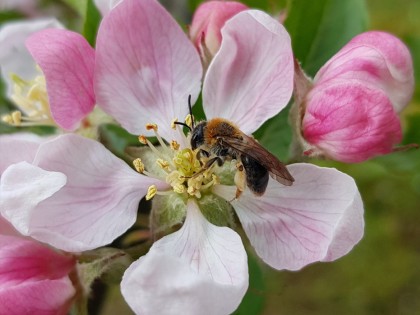
Insect pollination is worth €15 Billion in the EU but wild pollinators are declining because of loss of flower-rich habitats. In response the EU adopted a pollinator initiative in 2018. The North Sea Region is one of the most productive agricultural areas but pollinators are in decline across the region.
Background
The BEESPOKE project aims to increase levels of pollinators and crop pollination at local and landscape scales by providing land managers and policy makers with new expertise, tools and financial knowledge to create more sustainable and resilient agroecosystems.
BEESPOKE brings a wide range of partners together – from policy makers, research institutes, advisory and end users from six different North Sea Region-countries – to develop new products and approaches to increase the diversity of insect pollinators and crop yields by 10%. We will develop bespoke seed mixes and habitat management guidelines to support the suite of pollinators required for 14 crop types on 72 demonstration sites.
Sites for each crop will showcase best management practices, and training materials will be developed for biodiversity monitoring and for measuring pollination. The same type of agroecosystems occur across the North Sea Region and transnational cooperation will give economies of scale for development of these novel tools.
This approach will enable land managers to adopt pollinator management as a routine practice, fostering a bottom-up, land manager approach, ensuring a continuing improvement of crop pollination by insects.
Project title
BEESPOKE - Benefitting Ecosystems through Evaluation of food Supplies for Pollination to Open up Knowledge for End users
Funding
The programme is funded by the European Regional Development Fund (ERDF) of the European Union. SUSTAINABLE NORTH SEA REGION: Protecting against climate change and preserving the environment 
Videos
NIAB EMR staff give tutorials on establishing a wildflower area, monitoring insects in your orchard and the benefits of wildflower areas on pollinators and natural enemies in your crop.
Project duration
2019-2023
Partners
The 16 project partners are: Game & Wildlife Conservation Trust (UK), NIAB EMR (UK), University of Kent (UK), Universiteit Gent (BE), Vlaamse Landmaatschappij (BE), Inagro VZW (BE), Provincie Fryslân/Silence of the Bees (NL), Stichting Van Hall Larenstein (NL), Cruydt-Hoeck v.o.f. (NL), Coöperatieve vereniging Coöperatie Agrarisch Collectief Waadrâne U.A. (NL), Københavns Universitet (DK), HortiAdvice A/S (DK), Sveriges Lantbruksuniversitet (SE), Odling I Balans (SE), Carl von Ossietzky University of Oldenburg (DE), Grünlandzentrum Niedersachsen / Bremen e.V. (DE)
Photo gallery
Contact
Dr Michelle Fountain Email: michelle.fountain [at] niab.com
Visit the project website, like and follow the project on Facebook or read the latest newsletter.
